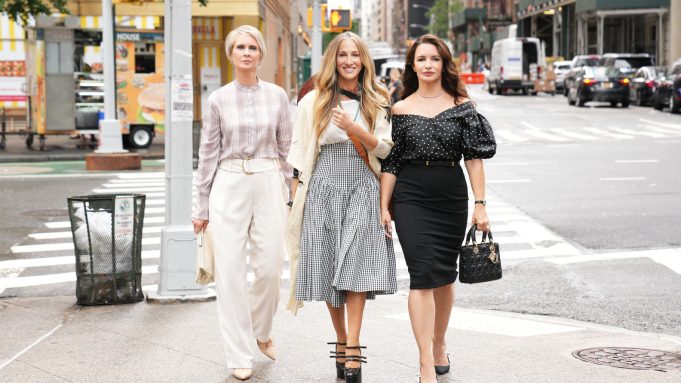Generation Black TV - Live
REVIEW ‘And Just Like That’: A Tragedy In Many Ways
REVIEW ‘And Just Like That’: A Tragedy In Many Ways
[simple-author-box]

Image courtesy of HBO
If you loved Sex and the City, there’d be a high chance that you’d love “And Just Like That’. Unfortunately, the iconic TV show set the bar too high for its 10 episode revival set eleven years after Sex and the City 2. It’s almost as if HBO decided to create a whole new show utterly different from Sex and the City without considering any of its original nuances.
Sarah Jessica Parker returns as iconic Carrie Bradshaw, yet even her participation in the revival isn’t enough to make it relevant. So do Cynthia Nixon and Kristin Davis as Miranda Hobbes and Charlotte York Goldenblatt, respectively. Kim Cattrall, aka Samantha, declined to participate in the revival because of her beef with Sarah Jessica Parker.
The first 15 minutes of the show are hard to watch for anyone who’s a fan of the original. There’s a lot of exposition explaining how Samantha angrily moved to London after Carrie essentially fired her. Not that it makes any sense given Samantha’s characterization, but oh well.
Let’s start by understanding the show’s original premise and analysing how that was implemented in the revival.
One of the most recurring themes of Sex and the City was how the characters in the show refused to grow up. Essentially, they were a group of women clinging to their idea of youth, be it dating younger men or spending ludicrous amounts of money on clothing and not on building an estate.
In the revival, we revisit these characters after starting their journey through their 50’s. Instead of a lens through women’s eyes in their current life stage, it instead finds any reason to attack the women, humiliate them and make them seem foolish for not keeping up with current trends.
And Just Like That seeks to address Sex and the City’s past criticism. One of its most recurring critics was the show’s lack of diversity on 90’s modern TV. It does so trying to be woke, except that it comes off as crass instead of waking. Some scenes make our main characters seem condescending fools, not actual people.
The show begins with an exciting conversation about semen because Miranda stepped on a used condom while going inside her son’s room. Carrie has become Insta-famous and featured on a podcast while Charlotte is dyeing her hair. We have scenes such as Miranda mis-gendering one of her students in her postgraduate program, then continuing class as normal now that she “knows everyone’s pronouns,” which seems to be used as an example to illustrate this tends to happen in modern society and
Then, Carrie is labelled the uptight cisgender white woman on the podcast. Every character is given a black friend to serve as their conscience, trying to pander to current generations while also trying to recapture the charm of the original.
While no one can deny that the original show featured more white people than Friends, it still didn’t try to take itself too seriously. It just went along with what it had and made it work while also making us laugh.
The show was highlighted by its matureness in explaining female friendships and its no-nonsense attitude towards sex. When you mix that with modern cancel culture insinuations, things get awkward fast. If anything, it makes the characters look like fish out of water.
The first episodes are painful because they don’t feature the allure of the original show, instead of trying to build upon existing nostalgia.
And by the way, Big dies in the first episode from a heart attack after a workout. While the show was awkward at first, its follow-up was tragic. Worst of all, he’s not the only character unceremoniously taken out of the show. After a couple episodes in, one couldn’t help but wonder if the show is a dramedy or a grim tragedy disguised as something else.
And Just Like That had the potential to be as ground-breaking as the original show, just that in different ways. It could’ve explored the experiences of aging women in their 50’s just like it did for them in their 30’s.
Yet, it spends most of its dialogue trying to take itself too seriously, catering to newer audiences who wouldn’t glance at the show anyway, and killing beloved original characters left and right.

